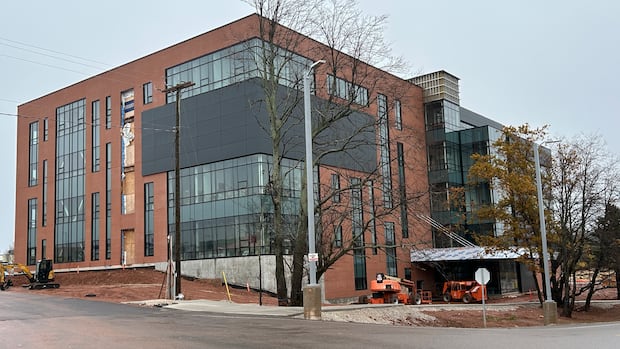Science
UPEI Launches Innovative Medical Simulation Centre for Future Doctors

The University of Prince Edward Island (UPEI) has inaugurated its new Clinical Learning and Simulation Centre, providing an advanced training environment for future healthcare professionals. This facility allows students to engage in realistic medical scenarios using state-of-the-art technology, including high-fidelity manikins that can mimic various medical conditions.
Catherine O’Brien, a well-known actor and director from Prince Edward Island, plays a crucial role in this initiative as a standardized patient. She has brought her experience from a similar program at the University of Toronto, where actors portray patients to create authentic training experiences for medical students. “They will learn how to interview, how to ask the right questions, how to make the patient feel comfortable using empathy,” O’Brien explained during an interview with CBC’s Island Morning.
Realistic Training for Medical Students
The new centre is designed to bridge the gap between theoretical education and practical application. Paul Charles, the simulation program manager, highlighted that the facility replicates real clinical environments. “We recreate simulation rooms like clinical hospital rooms, where they actually see medication carts and vital signs machines,” he said. The use of manikins that can breathe, talk, and exhibit symptoms such as heart attacks or seizures prepares students for real-world challenges.
This hands-on approach aims to enhance the competence and confidence of students, ultimately improving patient outcomes and reducing the strain on healthcare systems. The centre’s resources are not limited to students; healthcare professionals can also utilize the equipment to refine their skills.
Innovative Training Tools
A notable addition to the centre is a mobile “simulation rig.” This trailer, which can be transported by a truck, replicates the interior of an ambulance. Tammie Muise, the centre’s director, explained that this rig will allow healthcare providers to practice critical skills in time-sensitive situations, such as responding to a stroke or heart attack. “They can really fine-tune those skills to help improve patient outcomes,” she emphasized.
With the first cohort of medical students set to begin classes, O’Brien expressed enthusiasm about the upcoming training sessions. “I have a few coming up, which I’m excited to get going with,” she said, looking forward to enhancing the educational experience for these future doctors.
UPEI’s Clinical Learning and Simulation Centre exemplifies a progressive shift in medical education, prioritizing experiential learning to prepare students for the complexities of healthcare. As this new facility begins operations, it sets a precedent for innovative training methods in medical schools across the globe.
-

 Lifestyle2 months ago
Lifestyle2 months agoWinnipeg Celebrates Culinary Creativity During Le Burger Week 2025
-

 Health2 months ago
Health2 months agoMontreal’s Groupe Marcelle Leads Canadian Cosmetic Industry Growth
-

 Science2 months ago
Science2 months agoMicrosoft Confirms U.S. Law Overrules Canadian Data Sovereignty
-

 Education2 months ago
Education2 months agoRed River College Launches New Programs to Address Industry Needs
-

 Technology2 months ago
Technology2 months agoDragon Ball: Sparking! Zero Launching on Switch and Switch 2 This November
-

 Science2 months ago
Science2 months agoTech Innovator Amandipp Singh Transforms Hiring for Disabled
-

 Technology1 week ago
Technology1 week agoDiscord Faces Serious Security Breach Affecting Millions
-

 Technology2 months ago
Technology2 months agoGoogle Pixel 10 Pro Fold Specs Unveiled Ahead of Launch
-

 Science2 months ago
Science2 months agoChina’s Wukong Spacesuit Sets New Standard for AI in Space
-

 Technology2 months ago
Technology2 months agoWorld of Warcraft Players Buzz Over 19-Quest Bee Challenge
-

 Education2 months ago
Education2 months agoAlberta Teachers’ Strike: Potential Impacts on Students and Families
-

 Technology2 weeks ago
Technology2 weeks agoHuawei MatePad 12X Redefines Tablet Experience for Professionals
-

 Business2 months ago
Business2 months agoDawson City Residents Rally Around Buy Canadian Movement
-

 Business2 months ago
Business2 months agoNew Estimates Reveal ChatGPT-5 Energy Use Could Soar
-

 Science2 months ago
Science2 months agoXi Labs Innovates with New AI Operating System Set for 2025 Launch
-

 Technology2 months ago
Technology2 months agoInnovative 140W GaN Travel Adapter Combines Power and Convenience
-

 Technology2 months ago
Technology2 months agoFuture Entertainment Launches DDoD with Gameplay Trailer Showcase
-

 Technology2 months ago
Technology2 months agoGlobal Launch of Ragnarok M: Classic Set for September 3, 2025
-

 Technology2 months ago
Technology2 months agoNew IDR01 Smart Ring Offers Advanced Sports Tracking for $169
-

 Business2 months ago
Business2 months agoBNA Brewing to Open New Bowling Alley in Downtown Penticton
-

 Technology2 months ago
Technology2 months agoArsanesia Unveils Smith’s Chronicles with Steam Page and Trailer
-

 Science2 months ago
Science2 months agoNew Precision Approach to Treating Depression Tailors Care to Patients
-

 Technology2 months ago
Technology2 months agoHumanoid Robots Compete in Hilarious Debut Games in Beijing
-

 Health2 months ago
Health2 months agoGiant Boba and Unique Treats Take Center Stage at Ottawa’s Newest Bubble Tea Shop










